Link exchange is a method of exchanging backlinks with another website. The purpose of exchanging links with others is to improve SEO rank or to provide more information related to the content on the webpage.
To understand what link exchange is and how it affects SEO, you must first understand how Google views link exchange.
The Evolution of Link Exchanges: Do They Still Work?
The Evolution of Link Exchange
In the past, linking to other websites to improve SEO rankings and the authority of a website was a legitimate SEO practice. SEO experts and website owners would build links to other websites in their space to gain page rank. Since the number of outbound links was important in the past, building links and exchanging links with others was one of the fastest methods to get to the top of the search engine results page.
The Onset of Spam Websites
However, Google and other search engines soon realized that a lot of spammy websites were popping up on the top of the search engine results page, simply building links to thousands of low-quality domains. The purpose of some of these websites was to make visitors click on any one of the hundreds of links on the web page to redirect them to another useless page.
As a result, Google updated its ranking criteria and introduced changes such as Panda, Penguin, and Hummingbird to penalize websites that intentionally led visitors to spam. These updates also made sure that websites with low-quality content did not show up in the top ranking pages of Google.
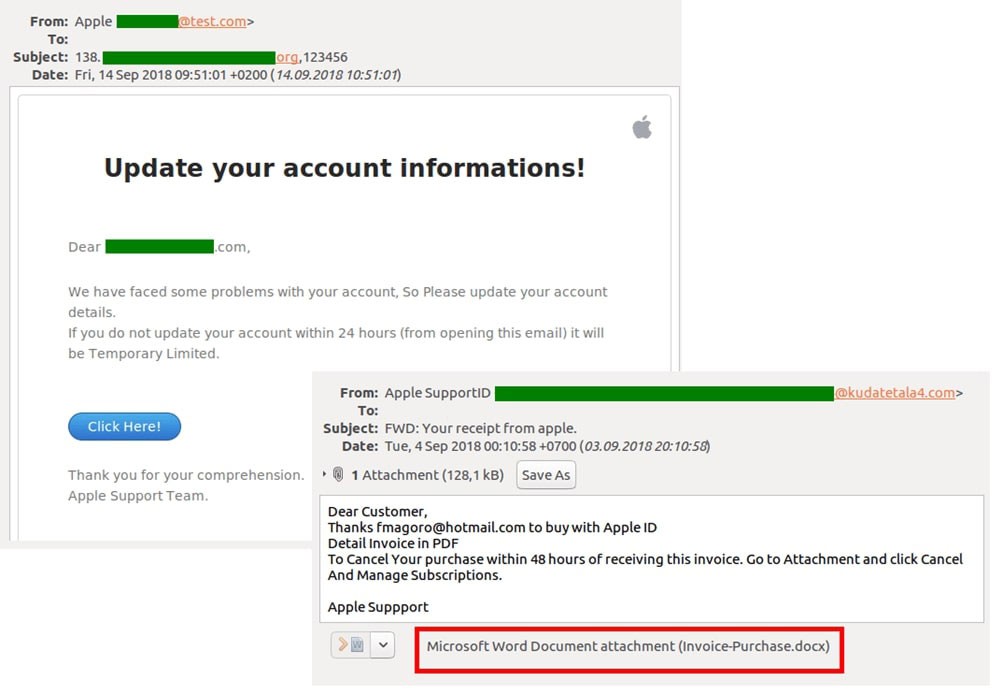
(Spam Website, Secure List)
These updates by Google also made website owners realize that spammy links on their website will get them banned. More importantly, SEO experts also understood that Google did not want low-quality links that were not relevant to the content on the website. For instance, if you owned a travel website and most of the outbound links on your website led to websites that had nothing to do with travel, such links were low-quality. These were low-quality links because they did not add value to the information on the website.
Did you know? Some links can hurt your rankings. Spammy or low quality links can hinder your search engine performance. (ironistic.com)
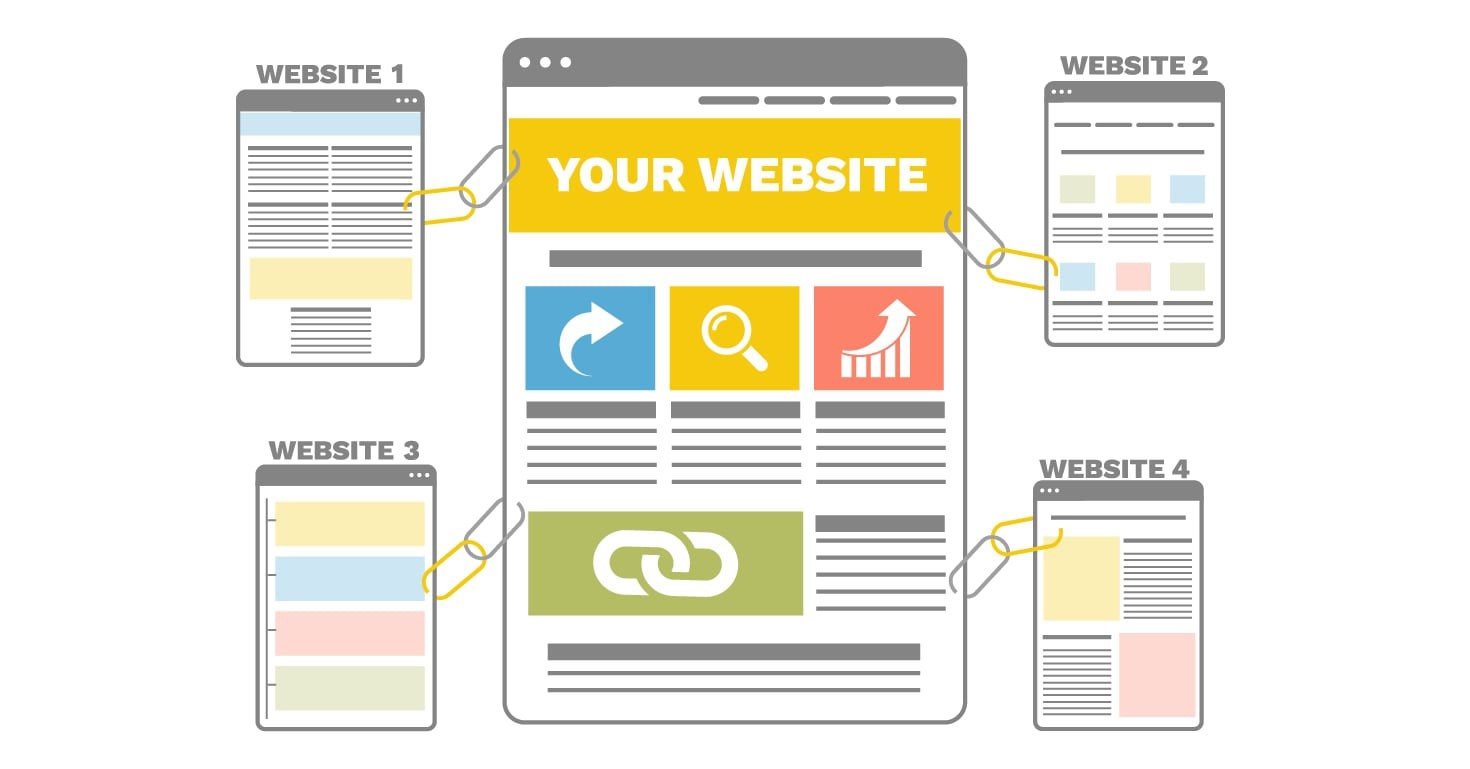
(8p Design)
The Era of Link Exchange Platforms
To adhere to the new Google guidelines, some webmasters began a link exchange platform. In a typical scenario, a website owner who ran a travel website would ask the owner of another travel website for backlink exchange using the link exchange platform.
The idea of a link exchange platform was to offer a seemingly authentic method to abide by the new rules of Google’s updates. It seemed to work because website owners found it easier to exchange links that were not spammy and the links were also related to the niche. However, this only continued to a certain extent until the next Google update, which also penalized websites that had too many reciprocal links. A reciprocal link is an agreement between two webmasters to provide hyperlinks on each other’s website.
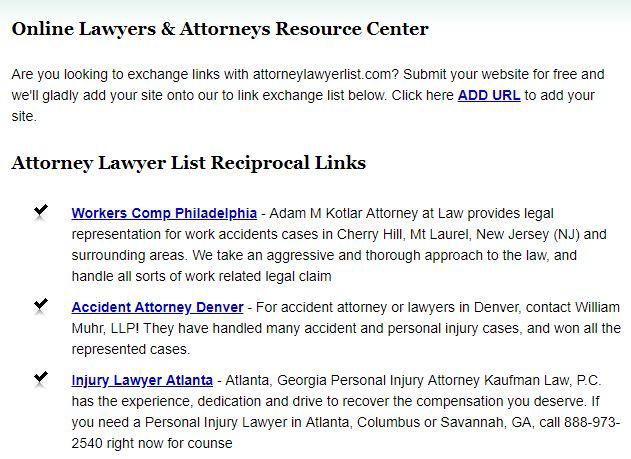
(Example of a link exchange platform. (Netvantage Marketing)
Google had a genuine reason to believe that such reciprocal links were damaging the purpose of providing quality content. SEO Experts explained that such link exchanges were harmful because they were mainly created for marketing reasons instead of providing relevant information that would add value to the content.
You Might Also Like
Even if such reciprocal links directed the customer to a website that would enhance the knowledge of the visitor about a certain subject, platforms that promoted such exchange of links were considered detrimental to the free flow of information. From a wider perspective of SEO, link exchange platforms didn’t make sense because link building would be restricted, which would give an unfair advantage to few people who could access these link exchanges. There were also a lot of other problems that are out of the scope of this topic. In short, Google didn’t want webmasters to subscribe to such link exchange platforms or build links just for the sake of marketing.
Did you know? 41% of SEO experts believe that link building is the most difficult part of the SEO process. (Ascend)
Improve your backlinks + SEO in 60 seconds!
Diib is one of the best link building tools in the world and can help you build your own high-quality backlinks. If you’d prefer you can also purchase high-quality backlinks at 50% off as a member.
- Backlink/keyword monitoring +new ideas
- Competitor linking analysis
- Checks for spammy (bad) backlink
- Over 500,000 global members
- Built-in benchmarking
- Free DA 69 ($500 value backlink) for all Pro members
Used by over 500k companies and organizations:
Syncs with 
Does Google Really Hate Reciprocal Links?
After reading the short history of a link exchange, you would question the legitimacy of Google guidelines because exchanging links with similar websites seems practical and fair. If backlink exchange is not a good idea, how should you create backlinks that are loved by Google?
Google doesn’t penalize websites for a link exchange because exchanging links is a natural process in link building. According to Google guidelines, they only warn against excessive reciprocal links.
- Excessive link exchanges (“Link to me and I’ll link to you”) or partner pages exclusively for the sake of cross-linking.
- Buying or selling links that pass PageRank.
Google emphasizes the repercussions that could result from excessive link exchange. As explained earlier, search engines don’t want link exchange platforms that will buy or sell links. Similarly, they don’t want links that are made just to be exchanged.
In simple words, it’s OK to ask another webmaster to share a link with you if the link is relevant. From an SEO perspective, if you try to build natural backlinks, reciprocal links will be only a small part of your overall links. Unless you want to spam search engines, it’s almost impossible to get a very large percentage of links from a website and ask that website to link to you. In a nutshell, such a strategy will take a lot of time and effort.
Did you know? 38% of digital marketers use page rank in order to determine the effectiveness of their link building strategies. (Aira)
Evidence that Google Doesn’t Hate Link Exchange
As a rule of thumb, keep link exchanges to less than 10% to 15% of your overall link building strategy. A recent Ahrefs study highlighted that almost every major website has reasonable link exchange on their website.
According to the study, the average reciprocal link on websites studied was 11.16%. It also noted that out of 16% of the websites, over 20% of links were reciprocal.
However, it was also noted that the research had included only the websites that were not penalized by Google. If Google had penalized websites, they were not available for the research sample.
Ahref researchers did another study to evaluate link exchanges on the top 10 results of Google. Their results revealed that nearly 44% of the web pages on the top ten positions in Google had some sort of reciprocal links.
It’s also interesting to note that nearly 6.7% of the web pages on top of the top 10 results had more than 5% reciprocal links. The study did not find any conclusive evidence that Google was in any way penalizing web pages that had a reasonable amount of link exchanges. Overall, it means that reciprocal links and link exchanges are a byproduct of the natural link building process.
To ensure that you don’t get penalized by Google, just make sure to avoid these:
- Purchased Links
Avoid a link exchange where you link to a particular page by paying the webmaster. While it’s true that Google can’t tell the difference between a paid link and a natural link, it’s a fact that IT experts are always on the move to catch spammy links.
Even without the technology, Google can penalize a webmaster that sells reciprocal links. If the website containing your link is penalized, you may feel the after-effects. In the future, a new Google update may also catch you, which will certainly ruin your efforts that took a lot of time and energy.
- Link Exchange Websites and Link Baits
If you search Google for the best link exchange sites, you will not find relevant results. It’s because Google and other major search engines do not endorse link exchange platforms that exchange links just for the sake of exchange. These link exchange websites do not provide any real value to the website visitors. If there are such websites, they are either already penalized or they sit at the bottom of the search engine results page.
Likewise, if you get an email from an anonymous source who asks you for a link exchange, be very careful. Even if the link exchange is from a reputable website, it does not mean that the website is immune to hackers and spam. Exchanging the link may land you in a lot of trouble as it can send a virus and breach other parameters.
- Low-Quality Web Directories
In the old days, web directories were a common way of building links to a website. it is recommended to place a link in the popular web directories but avoid low-quality or paid directories that will only harm your link building efforts.
So, what are the best practices for link exchange? Here are some important guidelines to help you decide if a link exchange is worth it?
We hope that you found this article useful.
If you want to know more interesting about your site health, get personal recommendations and alerts, scan your website by Diib. It only takes 60 seconds.
When Link Exchange Makes Sense
It’s important to explain that link exchanges can be very beneficial for your SEO if done correctly.
- Link exchange with a quality website can offer you a lot of decent web traffic. It’s also not unusual to see various web pages getting the majority of their traffic from a single strategically placed link.
- A link exchange is sometimes necessary if the information gives additional information on the subject. A link to an infographic, research study or another similar resource is great because it adds value to the subject.
- If the link exchange is from an authoritative site and the website is clean, a link exchange can boost your SEO rank even when the link is only remotely relevant.
- Exchanging links to other websites, which are not in direct competition with you, can provide additional traffic to your website.
Here are a few guidelines that will help you keep safe when exchanging links:
- It’s reasonable to exchange a link with a website that has website traffic of more than 3000 visitors per month. While website traffic is not a proper benchmark to judge a website, it may give clues to the long-term benefits you can gain from consistent traffic.
- Exchange a link with a website that has a DR, domain rating, of more than 40. A higher DR suggests a higher reputation in the eye of a search engine.
- A link exchange with a similar website can offer value to the website visitor. Before placing a link on a particular page, just make sure that it does not interfere with retaining your visitors. If you want the reader to buy a product from your website, a link to a similar website may take the potential client away from your website.
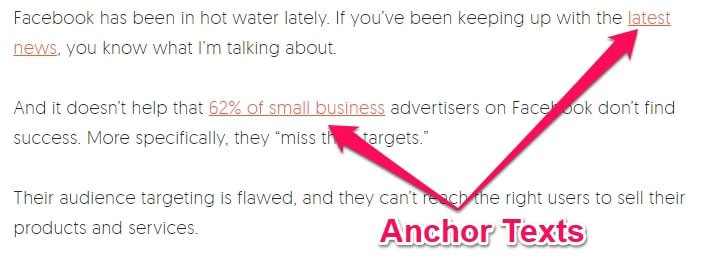
(Anchor text, Neil Patel)
You should now have a clear idea that there are no “best link exchange sites”. On the contrary, you should be concerned more about the webpage that you’re linking to. If the webpage is authoritative or it is relevant to your website, you will certainly gain traffic and authority with search engines.
If you still want to find some great options to exchange links, here are some legitimate methods to acquire them:
Top Link Exchange Methods
Local Links
You can find several types of link exchange through local directories and websites. These local resources provide information and details about businesses in the area. Besides, most of the resources are authoritative, which means they can pass a lot of high quality links to you. Similarly, “Google My Business” is another useful resource that not only allows you to gain visibility whenever someone searches for a local keyword. It will also enable you to get linked with Google.
Guest Blogging
A lot of highly reputable blogs allow others to write guest blogs for them. If you’re not a writer or you don’t have the time to write, ask a freelance writer to write an article for you. Just search Google for a variety of guest blogging opportunities.
Web Directories
There are tons of business and other web directories that have high page ranks. You can easily get a link from these directories. Just make sure not to submit your website using link submission services, which promise automatic listing on hundreds of directories for a small fee. The problem with automatic submission is the inability of the software to submit according to the Google guidelines. The result is low-quality links. If you can, always try to link manually.
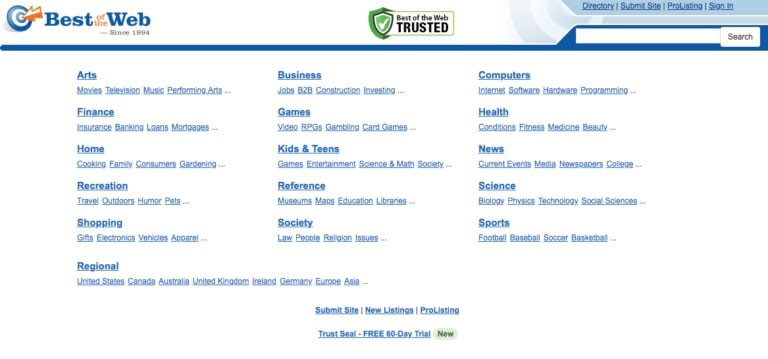
(Web directory, Search Engine Journal)
Photo Sharing
Websites such as Flickr are another great resource for getting quality links. If you allow others to use your photos using a Creative Commons License, people will link to your website by attributing your photo to your website.
Social Community Profile
If you don’t have a presence on social media, you’re missing out on lucrative marketing opportunities. Even if you have no intention to market your products using social media, it helps to maintain a passive presence on major social media channels to promote brand awareness. Creating a variety of social media channels and displaying a couple of products is enough to give you quality backlinks from authoritative websites.
Blog Comments
Savvy website owners use blogs to get traffic to their websites. Try to comment on a blog that also lets you create a profile. If you can share a piece of good advice, lots of people will click on your profile and may visit your website. Sometimes, blogs also allow you to leave a link under your comments. Try to leave comments on reputable blogs because you could start to see a steady amount of traffic in the long run.
Forums and Message Boards
Just like blogs, try to participate in forums and message boards relevant to your industry. Useful posts on message boards and forums will let others know that your website exists and you’re an expert in your field.
After reading this, you should have a pretty good idea of how link exchange works. Just remember, link exchange is a byproduct of your link building efforts. Whenever you build backlinks, make sure that link exchange and reciprocal links are only a certain percentage of your overall links. On a safer side, try to limit your reciprocal links to less than 15 percent.
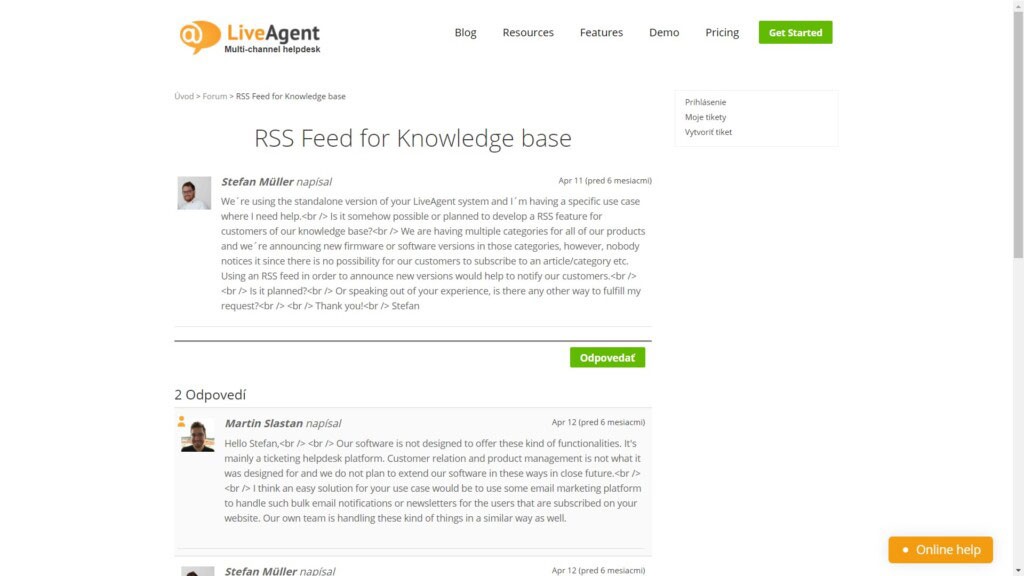
(Forum, LiveAgent)
Diib®: Analyze the Quality of Your Links Today!
If you are a website owner, diib can help you further your link building strategy by providing you with quality backlinks. Our services include:
- High Quality Guest Posts
- Backlink Analysis/Cleanup
- Linking you to reputable, high authority sites
At diib, we provide all the tools needed for your business to flourish. For more information on what our services can do for you, reach out to one of our highly skilled growth agents for a consultation at 800-303-3510 or click here for a free 60 second site scan.
FAQ’s
White hat- organically building links from reputable sites
Black hat- Link exchanges, oftentimes from spammy sites.
diib’s backlink analysis service will find and remove any spammy links that may be hindering your rankings.
Create quality content that makes readers want to link back to your site.
Add contextual links
Link relevant articles on your site together.
Link to high quality sites.
Ensure you are creating quality content.
Do not participate in link exchange.




Eileen Valdez says:
It is an amazing post and you explained in a detailed way. Nice to see this here. I will bookmark your blog for more details. Keep sharing the new things like this.
Anuj Shinde says:
This article provides a concise explanation of how link exchange works, making it easy for readers to understand the concept and potential benefits. It’s a valuable resource for those looking to improve their website’s SEO and link-building strategies.